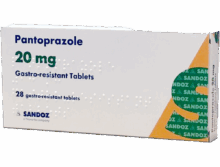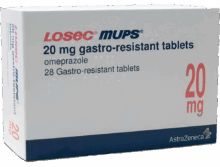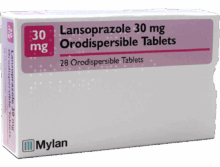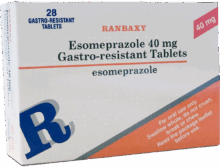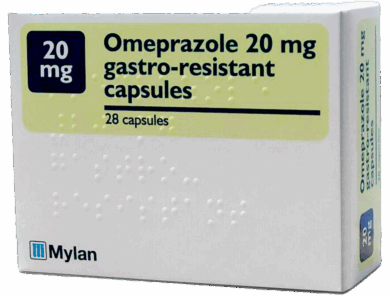
Omeprazole 20mg
from
£6.99
Omeprazole is an acid reflux treatment, which works to treat symptoms such as heartburn or indigestion. Omeprazole works by preventing the secretion of acid in the stomach. The recommended dose is one capsule daily.
Omeprazole 20mg
Can You Buy Omeprazole Over The Counter?
You can buy omeprazole over the counter at most pharmacies. You will need to have a consultation with a pharmacist beforehand, to ensure that treatment is safe for you to take. OTC omeprazole is limited to 14 tablets.
Omeprazole Prices
| Name & Dosage | x7 Capsules | x14 Capsules | x28 Capsules |
|---|---|---|---|
| Omeprazole 20mg Capsules | £6.99 | £9.99 | £16.49 |
Summary for Omeprazole
| Medication Class | Proton Pump Inhibitor (PPI) |
|---|---|
| Mechanism of action | Inhibits the production of stomach acid |
| Active ingredient | Omeprazole |
| Strength | 20mg |
| Effective within | 24 hours |
| Dosage Instructions | One capsule before eating |
| Manufacturer | Laboratorios Liconsa S.A |
| Use with alcohol | No |
About Omeprazole
Key Points
- Over the counter GERD treatment
- Targets symptoms of acid reflux such as pain, inflammation and heartburn
- Stops the production of stomach acid
- Can also be used to treat and prevent ulcers
What is Omeprazole?
Omeprazole is an acid reflux medicine that belongs to a class of medication known as proton pump inhibitors (PPIs). It is primarily used to treat symptoms of heartburn, indigestion and acid reflux. It is available as a generic medication, which means that it is unbranded. Generic versions of medication are usually cheaper to buy. The brand name for omeprazole is Losec.
What is Omeprazole Used For?
Omeprazole 20mg is used to treat symptoms of acid reflux (including silent reflux), indigestion, and heartburn. These stomach acid tablets can also be used to treat and manage stomach ulcers and as part of a treatment therapy to treat stomach infections caused by the bacteria Helicobacter Pylori. Omeprazole can reduce the chances of stomach irritation too if you are taking non-steroidal anti-inflammatories such as naproxen and ibuprofen.
What Does Omeprazole Do?
Omeprazole works by reducing the amount of acid that the stomach produces. The stomach is lined with proton pumps, which have the job of secreting stomach acid to help with digestion. Omeprazole blocks the action of the proton pump, so that less acid is produced. This reduces symptoms of acid reflux and heartburn.
How to Take Omeprazole
You should swallow the capsule whole, with a glass of water. You should not crush or chew the capsule, as it contains tiny pellets which carry the medication. They stop omeprazole from being broken down by stomach acid, and chewing or crushing can damage pellets, reducing the effectiveness of the medication.
If you cannot swallow the capsule, you should open it and empty the contents into half a glass of water. Ensure all the medication has been swallowed, taking care not to damage the pellets.
When to Take Omeprazole?
The best time to take omeprazole is half an hour before breakfast in the morning. Where possible, you should try to avoid foods that can trigger symptoms, such as coffee.
If you suffer from symptoms of acid reflux at night, your doctor may ask you to take one capsule in the evening, 30 minutes before dinner.
How Long Does Omeprazole Take to Work?
Most people will feel relief from symptoms within 24 hours of the first dose when taking omeprazole for acid reflux and heartburn. However, it can take up to 4 days of consistent use to feel the full effects. When used for the treatment of ulcers, you may notice relief in a few days, but it can take 4 to 8 weeks to complete healing. These timeframes can vary based on the type of condition being treated and how you react to the medication.
How Many Omeprazole Can You Take a Day?
You should only take one omeprazole capsule per day. Your doctor may instruct you to take it twice a day, but this dose is not licensed and requires specialist initiation and monitoring.
If you have been prescribed one omeprazole to take daily, but it is not having an effect, you should see your doctor or pharmacist for advice. You should take into consideration that it can take up to 4 weeks to feel the effects of omeprazole.
How Long Can You Take Omeprazole?
This depends on the condition being treated. The duration can be anything from 1 to 8 weeks and this may be extended further by your doctor if healing is not complete.
What to Do if You Forget to Take a Capsule?
If you forget to take omeprazole, take it as soon as you remember, and continue with your next dose at the right time. If it is on the same day, you are due to take a capsule, or you remember when it is time for your next dose, do not take two capsules together, or on the same day.
How Quickly Does Omeprazole Work?
Omeprazole works relatively quickly, and you should start to feel some relief within a few hours. If you are on long-term treatment, symptoms should start to improve within 2-3 days. It can take around 4 weeks for omeprazole to work properly.
How to Stop Taking Omeprazole
If you take omeprazole to treat occasional acid reflux, you can stop taking capsules at any time.
If you have been taking it long-term, stopping omeprazole suddenly can cause rebound acid production, where acid production by the stomach is higher than before treatment started. This usually lasts around 2-4 weeks. To avoid this, your doctor may reduce the dose of omeprazole for a few weeks before tapering you off, ask you to take omeprazole once every other day before stopping, or ask you only take omeprazole when you have symptoms. Alternatively, you may be prescribed an alternate treatment, such as Gavison, to help manage symptoms when you stop taking omeprazole.
Is Omeprazole Safe to Take Long Term?
Taking omeprazole for a long time can increase the chance of side effects such as:
- Low magnesium levels – Symptoms can include muscle twitching, tremors, abnormal eye movements, fatigue, vomiting, loss of appetite and weakness. The long-term risks of low magnesium levels (hypomagnesaemia) that are not managed can include seizures and heart problems.
- Risk of bone fractures – this particularly affects elderly patients who have been using omeprazole for longer than one year.
- Risk of developing Clostridium Difficile – An infection caused by bacteria which can develop in the stomach, due to reduced levels of acid production. Symptoms include stomachache, diarrhoea, loss of appetite and feeling sick. If you experience stomach pain when taking omeprazole, there is a chance that you may have developed an infection because of omeprazole suppressing acid production. You should seek medical advice in this instance.
Omeprazole should only be taken every day if it has been prescribed to you for long term management of symptoms. If you need to use omeprazole every day, your doctor is likely to monitor you once a year.
Does Omeprazole Cause Constipation?
Yes, constipation is a known common side effect which can affect up to 1 in 10 people. This should stop once treatment is complete.
Does Omeprazole Cause Weight Gain?
Weight gain is not directly associated with taking omeprazole. However, a reduction of stomach acid and relief from symptoms like heartburn or acid reflux may increase the amount of food you eat, which could lead to weight gain.
Why Does Omeprazole Cause Stomach Pain?
Stomach pain may be experienced by some people. When acid levels are reduced, it can cause an overgrowth of bacteria in the stomach or intestines and lead to gastrointestinal discomfort or pain. Stomach pain can also occur when omeprazole is stopped abruptly.
Why Does Omeprazole Cause Joint Pain?
Joint pains (arthralgia) or muscle pains (myalgia) can be experienced when taking this medicine, although this is rare. Magnesium levels, which are important for muscle and nerve function, can decline when using omeprazole for a long time. This may result in sore muscles, cramps and spasms.
When Should I See a Doctor?
We are unable to prescribe omeprazole if any of the following apply to you:
- Repeated symptoms of acid reflux for 3 weeks or more
- Unexplained weight loss
- Difficulty or pain on swallowing
- Blood or black coloured stools
- Abdominal swelling
- Persistent pain
- Vomiting or Diarrhoea
- Anaemia
- Those aged 55 or over with new or worsening symptoms
It may not necessarily be anything to worry about, but in these scenarios, it is best to be physically assessed by a doctor, who can rule out anything that could be hazardous to your health. If there is an underlying health issue that is causing acid reflux, omeprazole will only mask the symptoms, and not cure the problem.
What Can You Not Take with Omeprazole
Omeprazole should not be taken with any of the following medications:
- Certain antiviral medication to treat HIV or hepatitis C such as atazanavir, ledipasvir, rilpivirine, saquinavir, sofosbuvir, tipranavir, velpatasvir or voxilaprevir
- Certain anticancer medication such as ceritinib, dasatinib, erlotinib, gefitinib or pazopanib
- Certain heart medication such as clopidogrel, dipyridamole or digoxin
- Certain antiepileptics such as clobazam or phenytoin
- Certain antidepressants such as citalopram or escitalopram
- Certain antifungals such as itraconazole, ketoconazole, posaconazole or voriconazole
- Cilostazol
- Methotrexate
- Diazepam
If you are taking any of these medications, you should consult your doctor before taking omeprazole.
If you are taking an antacid such as Gaviscon, Tums or Milk of Magnesia for indigestion or heartburn, you should leave a 2-hour gap in between both doses for each medication.
Omeprazole and Alcohol
Alcohol has no direct impact on omeprazole but drinking alcohol can cause your stomach to secrete more acid than normal. If you are suffering from acid reflux, it is recommended to avoid consuming alcohol, as it can make symptoms worse.
Omeprazole and Ibuprofen
Ibuprofen is typically used in conjunction with omeprazole for people who need to take nonsteroidal anti-inflammatory drugs (NSAIDs) for symptom relief from gastrointestinal issues such as pain or inflammation but are at risk for gastrointestinal (GI) issues like ulcers or acid reflux. This needs to be monitored when taken on a long-term basis because when the two medicines are used together, they may potentially affect kidney function and increase the risk of bone fractures.
Why Can't You Take Omeprazole with Doxycycline?
Doxycycline requires the stomach to have an acidic environment to absorb properly. When your stomach acid is reduced by omeprazole, doxycycline can become less effective.
Omeprazole Alternatives
Which is better, omeprazole or esomeprazole or lansoprazole?
Omeprazole, lansoprazole, and esomeprazole all belong to the same class of drugs, known as Proton Pump Inhibitors. There is not much difference in the effectiveness of each treatment. Some studies have shown that lansoprazole is slightly more effective. Usually, the first line of treatment is omeprazole. If you are not experiencing any relief, your doctor may suggest appropriate alternatives to omeprazole and try switching you to lansoprazole or esomeprazole.
Lansoprazole vs Omeprazole
Both lansoprazole and omeprazole work in a similar way, have similar side effect profiles and there is little scientific evidence to suggest that one reflux medication is more effective than the other. Dosage slightly differs with omeprazole available in 20 mg capsules, and Lansoprazole available in both 15 mg and 30 mg capsules or in orodispersible form. Orodispersible tablets can be preferable for people who struggle to swallow tablets. You may decide on which medication to have based on personal preference and how you respond to the medication.
Esomeprazole vs Omeprazole
Both medicines block the production of acid in the stomach. Some studies have suggested that esomeprazole may have a longer effect on acid reduction. A higher dose of omeprazole may be required in some people to achieve the same level of acid suppression as esomeprazole. Esomeprazole may be recommended as an omeprazole alternative for people who may not have responded well to omeprazole.
Pantoprazole vs Omeprazole
Clinical studies have found that pantoprazole and omeprazole have similar effectiveness in treating gastrointestinal conditions. It is suggested that omeprazole may interact with other drugs at a higher rate, therefore pantoprazole may be preferred for those on multiple medications because of its lower risk of drug interactions.
Preventions
You can take steps to prevent acid reflux pain. Adjusting your lifestyle choices and making dietary changes will help to reduce your risk. You can try:
- Cutting out foods that increase stomach acid production
- Cutting out drinks that increase stomach acid production
- Reducing the portion sizes of every meal
- Leave smaller gaps between meals
- Sit upright during and after eating
- Chewing food thoroughly
- Maintain a regular exercise routine
- Stop smoking
Omeprazole Ingredients
Active ingredient: Omeprazole
Inactive ingredients: sugar spheres (consisting of corn starch and sucrose), sodium lauryl sulfate, disodium phosphate, mannitol, hypromellose, polyethylene glycol 6000, talc, polysorbate 80, titanium dioxide, Eudragit L30-D55 (poly(methacrylic acid, ethyl acrylate)). Capsules consist of gelatin and contain the colours quinoline yellow (E104) and titanium dioxide (E171).
Omeprazole Dosage Instructions
The omeprazole dosage for adults to treat acid reflux, indigestion or heartburn is: ‘Take one capsule daily, around 30 minutes before food’.
Omeprazole 10mg
This is usually the low ‘on demand’ dose of omeprazole. It is used to treat occasional acid reflux. It is preferable to use the lower dose if it is able to control symptoms. This reduces the chances of long-term side effects.
Omeprazole 20mg
Omeprazole 20mg is used to treat acid reflux for those that suffer with chronic acid reflux. It is also the dose that is used to protect the lining of the stomach if you are taking or anti-inflammatory tablets, such as naproxen.
Omeprazole 20mg is also used for treating stomach ulcers, H. Pylori, and a condition known as Zollinger-Ellison syndrome, a rare disorder which results in the over production of stomach acid.
Omeprazole Side Effects
Like all medication, side effects of omeprazole are possible, although not everyone experiences them.
Common side effects include:
- Headache
- Diarrhoea
- Nausea
- Stomach pain
- Constipation
- Dizziness
- Anxiety
These are reversible and should resolve once you stop using treatment.
If you notice any of the following symptoms, you should stop taking omeprazole and seek urgent medical advice:
- Wheezing, difficulty swallowing, rash, fainting, or swelling of the tongue, lips, mouth, throat or body. These are signs of a serious allergic reaction.
- Skin irritation includes reddening of the skin, blisters, or peeling. These are side effects of a rare but serious reaction to omeprazole.
- You should read the patient information leaflet for a full list of side effects.
Omeprazole Warnings
Your risk of fracture in the hip, wrist or spine may increase, particularly if you take a proton pump inhibitor for more than a year. If you notice any new symptoms, book to see your GP and explain what your symptoms are. You should also tell your doctor if you have osteoporosis or if you are taking corticosteroids because you will likely have to be monitored.
Omeprazole Interactions
It’s important to be aware of possible interactions when taking this medicine. Some medicines can alter the way omeprazole works, and omeprazole can have the same effect on some medicines.
Omeprazole and Pregnancy/Breastfeeding
Can you take omeprazole when pregnant?
There is no evidence to suggest that using omeprazole in pregnancy will harm the baby. It is usually safe to take by pregnant women, however, this should be done under the supervision of your doctor. Your doctor will assess the benefits against the risks.
Omeprazole is present in breastmilk; however, the amount is thought to be too small to affect a feeding infant. You should only take omeprazole when breastfeeding, under the guidance of your doctor.
For more information about omeprazole acid reflux treatment, take a look at the patient information leaflet: Ompeprazole 20mg Gastro-resistant Patient Information Leaflet
Frequently Asked Questions
It’s best to wait 15 to 30 minutes before consuming anything, including milk. This will help to ensure that omeprazole is absorbed without interference.
The best time to take omeprazole is in the morning because omeprazole is most effective when taken on an empty stomach and food intake triggers acid production.
No, they are different medications. They are both classified as Proton Pump Inhibitors and are effective in treating conditions like gastroesophageal reflux disease (GERD), peptic ulcers, and Zollinger-Ellison syndrome.
Typically, you can only take one omeprazole capsule per day. There may be some exceptions, but this is assessed and monitored by a doctor.
Omeprazole is usually cleared from the bloodstream within 3 to 4 hours, but the effects can last up to 24 to 72 hours.
It is considered a safe short-term treatment for most people to treat gastrointestinal conditions when used correctly. Like with any medication, side effects are possible.
They can deliver complimentary action, offering relief from symptoms of acid reflux and heartburn. While acid production is reduced by omeprazole, a barrier is formed and neutralizes any remaining acid by Gaviscon. We recommend you leave a 2-hour gap in between both doses for each medication.
Product Reviews
product rated 5/5
Great service
By Muhammad Arslan Waraich (via TrustPilot)Great service and fast delivery. Recommended.
By Sean Perera. (via TrustPilot)The product is of good quality and recognised branding. Worked exactly as stated in the instructions
By William (via TrustPilot)It helps me a lot. I take it every day.
By SHERIF EL SHAER (via TrustPilot)Superintendent Pharmacist
Written by Chemist Click
First created 22nd April 2025
Last reviewed 10th October 2025
Other options include:

Our Awards & Certifications
Our team of experienced pharmacists and healthcare professionals are dedicated to providing the highest level of care and service to every customer, ensuring that they receive the best possible healthcare experience.

Our Clients Say:
Constantly good service, always very quick to deliver items.
By Phil ElliottHighly recommend. Fast delivery. Reliable.
By Carlene GraceHave ordered before and had a great experience. I order a hayfever spray that my GP no longer issues on prescription. Easy process. Will definitely use again.
By CarolineHad a great experience, right from consultation to medicine delivery it was very efficient and professional. Thanks.
By Shefali PathakEasy to navigate website, regularly use their service, prompt timely delivery, discounts for regular customers could be considered.
By ArunI shopped around before purchasing and items price was good. Delivery was prompt and P+P reasonable. Item was as described. Good service.
By Mark LockettGood website, intuitive with great information. Efficient, from payment through to delivery, and good communication updates all the way.
By Graeme WalkerExcellent service. I ordered some medication which was dispatched very quickly and arrived super fast. The medication has a very long expiry date. I would definitely order again. Many thanks.
By Ian TBest company there is for me. Great service and excellent quality plus pricing is perfect. I wouldn't want to use anyone else in all honesty. I have recommended this company to all my friends. It's a tricky subject for us older guys but this company makes it all respectful and they discretion is very much appreciated by us all.
By Neil Franklin
